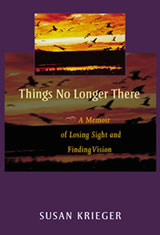
Things No Longer There
Stories behind the Story:
The eBook and the Audio Book
From the University of Wisconsin Press Website
In Things No Longer There: A Memoir of Losing Sight and Finding Vision, Susan Krieger asserts a very positive message concerning loss of sight both in the stories within the book and in her efforts to make sure the printed word is accessible.
Driving New Technology Forward
Since January 2005, Krieger has been working with the University of Wisconsin Press to ensure that an accessible digital version of Things No Longer There will be available for blind readers simultaneous with print publication. "There is no longer an excuse," says Krieger, "for books and articles printed on paper for the sighted not to be available in digital print form for the blind." For years, audio books on tape have been produced by organizations such as Recordings for the Blind and Dyslexic and the National Library Service. These, according to Krieger, rely on an agency to preselect which books warrant recording, and there is a lapse of time before the recordings become available. Given today's computer technologies, digital versions of printed materials require no intermediary organization; a digital or electronic version of a book, integrated with the printer files, is available at the composition stage. Because of this, digital files can be made available immediately, without prejudice of selection, and through screen readers (a computer synthesized voice program used by the blind) they can make a blind person's access to reading materials equal to that of a sighted person. "I need only to obtain the files, either on disk or as an attachment, then I sit at my computer, with my screen-reading software, and I can promptly read the text," says Krieger. "I can be as excited about a new book as anyone else!"
Drawing on her own personal experiences, Krieger tested out all aspects of the printed book herself to make sure they would read aloud properly and worked with the Press production staff to make the digital version of the book not only available for blind readers but also user friendly.
The Blind Reading the Blind
Not that Krieger overlooks the importance of audio recordings. A long time reader of books for the blind who currently records materials for students at Stanford will be taping Things No Longer There on publication--interestingly, the reader herself has recently become blind.
"I wanted the book to be immediately available for my blind friends and colleagues whose preferred format is the human voice or who may not be agile with computers," Krieger explains. "So last spring when I was teaching my course on women and disabilities, I asked the Stanford Disabilities Resource Center for a recommendation of their best reader, whom I contacted. Two months ago, I called her to check on whether she was still willing to record the book. 'Definitely,' she said, and then added, 'You know, since I talked to you last year, I have become legally blind myself.'"
"I was startled," says Krieger. "I didn't quite know what do to. How could she record my book if she couldn't see? But as if reading my thoughts, she said to me, 'I have a closed circuit TV. It enlarges the book for me. I can do it just fine.'" Krieger felt touched. "This is a case of the blind reading the blind, for the blind. It couldn't be more perfect. And each of us has a different kind of sight."
The Author's Personal Journey
Krieger has increasingly been losing her eyesight since she began to write Things No Longer There. She has gone from reading 12 point type to requiring 42 point bold type, a font so large that reading text directly on the computer screen is awkward and a screen reader is a more feasible option. "It is certainly a process that emphasizes learning," she says. In Things No Longer There, she describes her initial experiences when learning to walk with a white cane. She now walks with a guide dog named Teela, a golden retriever-labrador retriever cross. They will be visiting various universities beginning next fall when Krieger speaks about her book.
eBook
An accessible eBook for the blind was released by the University of Wisconsin Press simultaneous with print publication in May 2005.
- The digital version of Things No Longer There is now available on request for blind readers from the University of Wisconsin Press and comes complete with accessibility instructions from the author.
- For an accessible eBook or audio book, please contact Margaret Walsh, phone (608) 263-1131, e-mail:
mawalsh1@wisc.edu
Audio Book
The UW Press is pleased to announce that an audio book version of Things No Longer There is now available as well. The audio book can be obtained in either CD or MP3 format. Especially of interest to those losing their vision will be chapters 8, 9 and 10, which contain the author's stories of her own loss of sight. The book is read by a longtime reader of books for the blind who is now herself legally blind:
From Track 2: Betty Risser's "Reader's Note":
"My name is Betty Risser and I am very honored that I can record this wonderful book. For thirty-five years, I have recorded textbooks for blind, dyslexic, and learning impaired college students. As I became legally blind recently, I am fortunate that I can continue to read, and this book is read by use of my closed-circuit TV."
Author Susan Krieger has recorded an introduction on the audiobook as well.
For further information about the eBook and audio book, listen to an interview with the author on Tech Nation radio.
